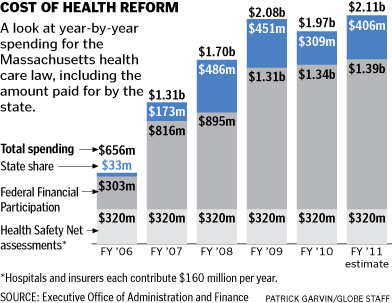There has been a lot in the national press about how health care reform in Massachusetts has worked.* There's a lot of blather on both sides of the political spectrum, and the Boston Globe*had a comprehensive article today reviewing how “RomneyCare” is working here.*
Conclusions:
1) Far more people are insured than before health care reform, despite the disastrous recession (98.1%)
2) More employers (up from 70 to 76%) are offering insurance, again despite the recession
3) The exchanges work for individuals - they haven't worked well for small employers yet
4) The cost of the care of the uninsured has declined.
5) There is inadequate primary care access, and ED visits have gone up rather than down.
6) The cost has been manageable - but the state has relied on some payments from the feds (stimulus dollars and Medicaid add-on dollars) that will not continue. The federal government has paid a disproportionate share of the total cost (as it will under the Affordable Care Act).
7) Health care reform promised incremental provider Medicaid payments that have not been funded. Hospitals say they must pass these costs on to other payers, which worries employers greatly.
8) Health care reform is actually pretty popular in Massachusetts.* The last Harvard School of Public Health poll said that 63% of residents support health care reform.*


